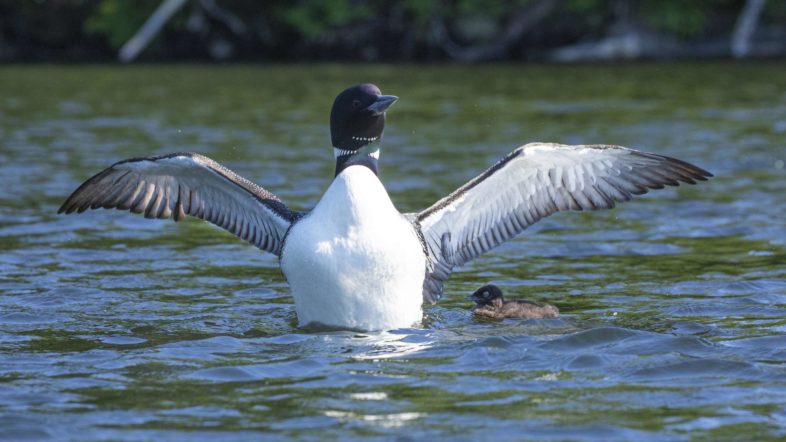
An adult loon on Kent’s Pond spreads its wings, with chick close by. Photo by Paul Holmes.
July is a busy month in Vermont’s Common Loon world: chicks hatching, some pairs still seeking nesting success, and biologists and volunteers trying to keep up with all the action. This July, we’ve got plenty of opportunities to get involved and learn more about loon conservation—check them out below.
July Loon Update
As of late June, we have confirmed 93 nest attempts, 20 failed nests with four re-nests, and 37 successful nests. For comparison, last year saw a total of 96 nests for the entire season. We have also documented three new nesting pairs, two of which are in west-central Vermont on Glen and Sunset lakes. Previously, Old Marsh Lake was the only lake in that region with nesting loons. Some more good news: the pair on Clyde Pond in Newport had its first successful nest ever!
Right now, volunteers and VCE staff are busy following the pairs that have not yet nested. The big question in everyone’s minds: will they nest? Hopefully, the coming weeks will provide some answers. In the meantime, you can learn how to get involved by visiting the Focused Loon Surveys section of our LoonWatch participation page (more information on this at the end).
Webinar with Dr. James Paruk on his new book, Loon Lessons: Uncommon Encounters with the Great Northern Diver
Join Dr. James Paruk and I as we discuss his new book on the Common Loon. Paruk has observed and compared loons from Washington and Saskatchewan to the coasts of California and Louisiana, from high elevation deserts in Nevada to mountain lakes in Maine. Drawing on his extensive experience, a wealth of data, and well-established scientific principles, he considers every aspect of the loon, from its plumage and anatomy to its breeding, migration, and wintering strategies. Here, in the first detailed scientific account of the Common Loon in more than thirty years, Paruk describes its biology in an accessible and entertaining style that affords a deeper understanding of this beautiful and mysterious bird’s natural history and annual life cycle.
The presentation will take place on Thursday, July 15 at 7pm on Zoom. Once you register for the presentation, you will receive an email containing the Zoom link.
Understanding Malaria Emergence in Common Loons
In 2015, a loon from Lake Umbagog in New Hampshire became the first loon ever documented to have died from avian malaria. Since then, a handful of other loons in New England have died from malaria. Previous studies over 30 years had shown Common Loons to be free of malaria parasite infection, making these new occurrences quite concerning. Dr. Ellen Martinsen and her students at the University of Vermont are studying this newly emerging disease in Common Loons with the hopes of uncovering some answers.
If you want to support this important research and learn more, visit Dr. Martinsen’s funding campaign on Experiment.com.
Want to learn even more about this project? Watch Dr. Martinsen’s presentation for the Loon Preservation Committee.

LoonWatch volunteer Katherine Walker pauses to observe loons off in the distance. Photo by Robert Hoffman.
Don’t miss the annual statewide LoonWatch count on July 17!
Looking for an excuse to go paddling or boating? We are looking for a few more volunteers to cover unassigned lakes for the annual LoonWatch count. Volunteers should conduct their surveys between 8 and 9 a.m., or earlier for large lakes. You can survey a few lakes from shore but most will require some kind of boat.
During the annual LoonWatch, volunteers cover nearly every lake down to those 20 aces in size. Many tiny lakes will not have loons, however this is also important information for us to gather. Even if your small lake doesn’t have any loons, there are still other opportunities to spot these beautiful birds. We highly encourage volunteers who take on small lakes to visit several ponds in the region or check out a nearby larger lake with loons (even if someone else has it covered) once you have finished with your assigned lake.
In 2020, community scientists surveyed almost 170 lakes and ponds counting a record 358 adult loons. We’re excited to see how many are documented this year!
Check the 2021 LoonWatch lakes in need of volunteer list on the LoonWatch participation page. This list frequently changes, so please email Eric Hanson to confirm the lake still needs a volunteer.
Participate in Focused Loon Surveys
Please also consider visiting lakes in need of surveys all summer long. We will post updated lists throughout the season as new information comes in and we determine where more surveys are needed. For more information, go to the LoonWatch participation page and scroll down to Focused Loon Surveys. There are several lists, including a master list where we have fewer volunteers, and then specific lists for nesting and pair formation and chick survival (check back in August for this last one).
We look forward to seeing you out on a lake or in a virtual event this July! Keep an eye out for an update with LoonWatch results later this month.
